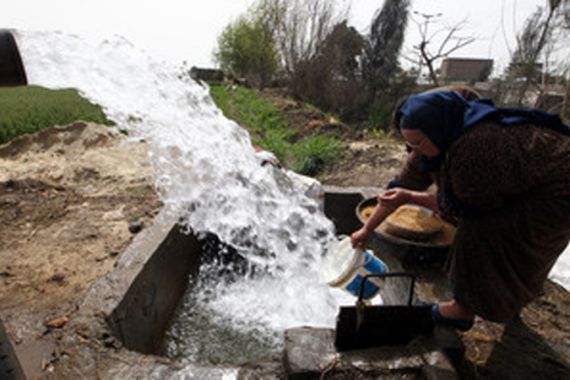Rapprochement on the Nile
The Egypt-Ethiopia dispute over the Nile basin can evolve into a strategic partnership.

Ethiopia and Egypt have successfully managed to end their millennia-long rivalry over the river Nile. Ethiopia’s announcement in 2011 of its intention to construct Africa’s largest hydropower plant on its share of the Blue Nile led to developments that radically changed bilateral relations and hydro-politics in the Nile basin.
Since 2011, Cairo had claimed that Ethiopia’s Grand Renaissance Dam (GERD) would constitute a critical threat to its water security. The dispute reached its peak in 2013 when former Egyptian President Mohamed Morsi’s subtle threats of military action against the dam had war clouds looming over northeastern Africa.
Keep reading
list of 4 itemsPhotos: Heartbreak in Zimbabwe park – Elephants’ desperate hunt for water
Photos: Natural disasters that plagued the world in 2023
‘Everything is dead’: How record drought is wreaking havoc on the Amazon
But by by mid-2014, Egypt had effectively changed its centuries-old hydro-policy – which by and large consisted of retaining a near monopoly on the utilisation of the Nile waters. It no longer considered the building of any dam on Ethiopia’s share of the Blue Nile as an unacceptable compromise of its water security. Instead, Egypt now accepts Ethiopia’s right to develop its hydropower resources – as long as it doesn’t cause significant harm to its own water supply.
Emerging cooperation
Sudan was instrumental in tipping the diplomatic balance in favour of Ethiopia. Khartoum, which had coordinated its Nile policy together with Egypt for decades, changed its alliance in December 2013, and voiced its support for GERD.
Ethiopia had also simultaneously been actively signalling its desire for a “win-win” solution to all parties – in a bid to ease downstream insecurity.
|
|
| People & Power – Land for Sale |
By early 2014, around 30 percent of the dam construction had already been completed, and Egypt’s inability to prevent the construction of GERD, both through military or diplomatic means, had become increasingly apparent. All of which played into Egypt’s new diplomacy on the Nile.
The diplomatic turning point followed Egypt’s change of government in 2014. On June 26, the newly sworn-in President Abdel Fattah el-Sisi and his Ethiopian counterpart PM Hailemariam Desalegn agreed at the AU summit held in Malabo, Equatorial Guinea, to find a mutually acceptable solution to the dispute over GERD, and to look into other possible areas of cooperation by resuming their stalled Joint Ministerial Commission.
On November 3, the old rivals, Ethiopia and Egypt, were busy signing cooperation agreements and MOUs in trade, education and health sectors. This had been preceded by regular mutual visits by government ministers from both countries.
In the third tripartite negotiations between Ethiopia, Sudan and Egypt held in August, the parties agreed to commission an international consultancy company to conduct a social, economical and environmental impact assessment of GERD. Technicalities relating to the timeframe for filling up the reservoir can possibly stall the dialogue, however, a reversal of the reconciliation process is highly unlikely – albeit not impossible.
Overlapping interests
The possibilities and implications of cooperation between the two regional giants, Ethiopia and Egypt, have until now, not received serious attention. The conflict over the Nile had overshadowed the fact that their regimes might be rather politically compatible and their economies complementary.
The hydropower sector – ironically the source of the historical rivalry – is the best example of overlapping interests. Egypt currently generates 90 percent of its electricity supply from fossil fuels, and has already reached the limits of its hydropower production capacity. More than half of its domestic natural gas consumption is used for electricity generation, and an increase in electricity demand means that there is a risk it will have to begin utilising even more expensive fuels.
|
|
| Ethiopia’s dam project weighs down on economy |
Ethiopia’s potential hydropower production capacity is estimated to be 45GWh, that is, double that of Egypt’s current total demand. In its effort to jumpstart the integration process, Ethiopia has begun exporting electricity to Sudan, Djibouti and Kenya at one of the cheapest market prices, and has indicated its desire to do the same to Egypt. The absence of grids connecting Egypt and Sudan is, however, according to Ethiopian MFA official, Zerihun Aebebe, a practical problem that needs to be overcome before this can be realised.
The different stages of development of these two economies makes integration in broader terms also complementary. The Egyptian economy is far more developed than the Ethiopian; it has more financial capital, and is substantially more industrialised than Ethiopia, which is to a large extent still an agriculture-dominated economy.
Investments would lead to long-term integration that could build trust among peoples, not only governments. The Egyptian Minister of Industry and Foreign Trade, Mounir Fakhry Abdel Nour, announced on a recent visit to Addis Ababa that the possibilities of establishing an Ethiopian-Egyptian industrial zone in Ethiopia was being studied, and that they aspire to increase trade between both states from $165m to $500m annually.
Despite economic and strategic rationales for integration, initiating such a process in the context of mutual insecurity and historically rooted animosity is to some extent dependent on having somewhat like-minded groups at the helm in both countries. Sisi’s anti-Islamist and statist political regime has a foreign policy orientation that is more compatible with the secular Ethiopian Peoples Revolutionary Democratic Front (EPRDF). Both governments face the consequences of instability and conflict in their neighbourhood.
The Ethiopian-Egyptian rivalry has historically been an important factor sustaining regional disorder. Ethiopia’s rapprochement with the continental diplomatic powerhouse, Egypt, can give momentum to regional peacemaking efforts in what has arguably been the most conflict-prone corner of the continent.
Goitom Gebreluel is an adviser at the International Law and Policy Institute. He has previously worked for the Norwegian government (Norad) and taught foreign policy studies at Mekelle University, Ethiopia.
